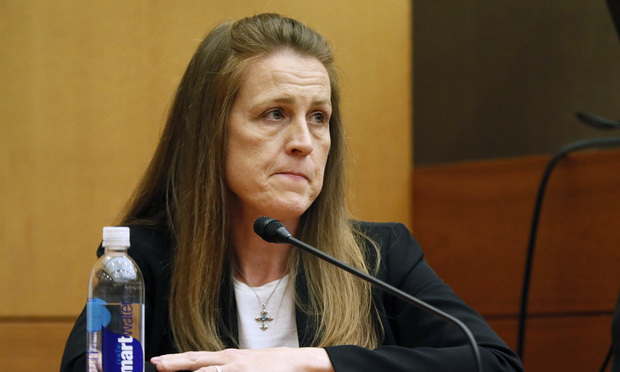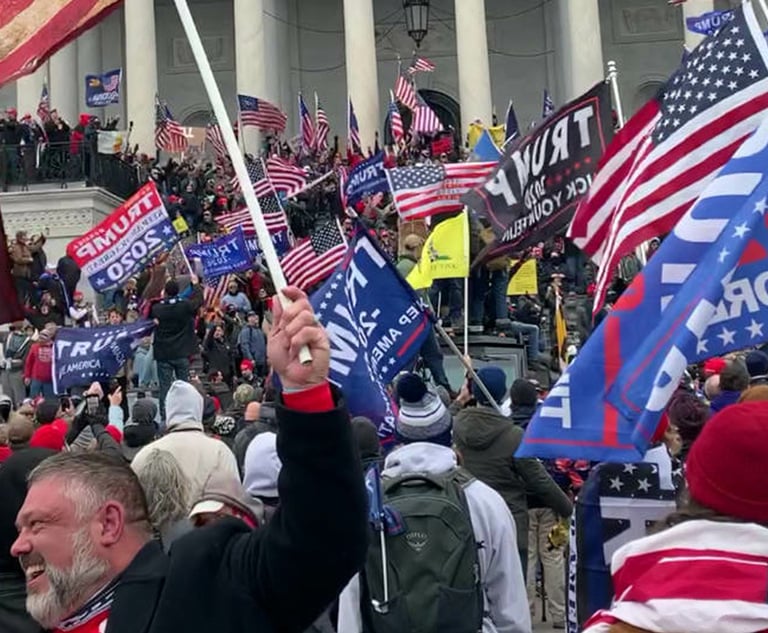Masseuse Says She Spent Week With Medicated McIver to Protect Him From Harm
Prosecution witnesses have testified that Annie Anderson, who was a massage therapist for Tex and Diane McIver, was frequently in McIver's company the week after his wife died.
April 12, 2018 at 03:54 PM
6 minute read

A massage therapist who spent the night in Atlanta attorney Claud “Tex” McIver's bedroom the night after he fatally shot his wife, and who accompanied him to an interview with Atlanta police, testified Thursday that she never had a romantic relationship with him.
Defense attorneys called Annie Anderson to testify in McIver's ongoing murder trial to counter references to her continued presence in the former Fisher & Phillips partner's company in the days following Diane McIver's death. That included testimony from Rachel Styles, Diane McIver's part-time personal assistant, who said Anderson slept on a pallet on the floor of Tex McIver's bedroom the night after his wife's death.
It also included testimony from Jay Grover, an executive at U.S. Enterprises where Diane McIver was president, who testified that Anderson was at the McIvers' ranch southeast of Atlanta the following weekend wearing a pair of boots he and his fiancée had given Diane.
In response to a series of questions from defense attorney Don Samuel, Anderson said she had “1,000 percent never” given Tex McIver a massage when he was naked, never touched him sexually, and that McIver never had sexual contact with her or, for that matter, done anything inappropriate.
Anderson testified as her husband—who had been Tex McIver's personal trainer—looked on from the courtroom audience.
Anderson also testified that, when she gave Tex McIver massages, he would often fall asleep on the massage table.
“He would have conversations in his sleep,” she said. “And then, depending on what he was saying, he would act things out.” McIver, she said, might flail an arm or throw a punch, and she “would have to get out of the way.”
McIver's defense team called a sleep expert to the stand Wednesday who said McIver was diagnosed with two sleep disorders. Dr. David Rye said one of those disorders, confusional arousal or sleep drunkenness, could be “one possible explanation” for McIver firing the gun he was holding in the back seat of the couple's SUV as they rode through downtown Atlanta.
Anderson took the witness stand as defense attorneys sought to debunk the prosecutors' narrative that McIver had a financial motive for the fatal shooting and to rehabilitate their client as a man who loved his wife and was devastated by her death.
Prosecutors have repeatedly elicited references to Anderson's presence as they sought to counter defense contentions that Diane McIver's shooting was an accident and that McIver and his wife were “lovebirds.”
Anderson said Diane McIver had scheduled an appointment at 7:30 a.m. Sept. 26, 2016, at the McIvers' condo. Tex McIver canceled that appointment via text message after Diane McIver died. Anderson said her best friend got news of Diane's death and called her. Anderson said she arrived at the McIvers' condo with her best friend, another massage therapist, a short time later.
She said Tex McIver's personal physician was there and that she was told McIver had an anxiety attack while at the hospital after Diane McIver died. McIver had been given some anti-anxiety medication, Anderson said, and she and Rachel Styles were tasked by Mciver's physician with monitoring him. Styles was Diane's personal assistant and a former nurse.
“We were concerned about his safety,” she said.
That night, after Diane McIver died, Anderson said she spent the evening in McIver's bedroom, sitting on two pillows on the floor next to the wall. Styles and Anderson's friend slept in the living room. Anderson said she never joined McIver in bed but would gently jostle him in a maneuver she described as “polarity rocking” when he had nightmares.
Anderson said she remained at McIver's condo the entire week. She said she never gave him a massage, although Dani Jo Carter, a family friend and witness to the shooting, testified she saw Anderson massaging a shirtless McIver in his bedroom.
Anderson acknowledged she did accompany McIver on Sept. 28, 2016, to his only interview with Atlanta police. She said she did so after driving him to meet his lawyers first, because McIver was not allowed to drive while taking anti-anxiety medication. After the police interview, Anderson said she drove McIver home.
Anderson said her husband and daughter joined her at the condo on the fourth night. That Friday, she said she and McIver headed to the couple's ranch near Lake Oconee in Diane's Jaguar. Again, Anderson was driving.
Anderson said she volunteered to stay with McIver that week, and “He actually tried to get me to go home.” She said she was close to Tex McIver's family, including his mother, sisters and brothers, and that someone needed to keep his family updated.
“I felt I was the best person to do that,” she said.
In an animated debate outside the jury's presence over whether Samuel could explore the personal toll prosecutors' insinuations have had on Annie Anderson, the defense lawyer sparred with Fulton County Superior Court Judge Robert McBurney and Assistant District Attorney Clint Rucker over repeated references to Anderson that have surfaced during the trial.
“What was going on was a clear effort by the prosecution to claim and to try to convince this jury that they were having sex, and that is why he killed his wife, [that] he wasn't deeply in love, [that] he killed his wife because he was sleeping with his masseuse,” Samuel said.
“Had we not called Annie Anderson to the stand, I guarantee that 12 out of 12 jurors would have thought they had sex,” he said.
But McBurney said the defense made McIver's character an issue by contending he was a Southern gentleman who always referred to his wife as “darlin,” that the couple were “lovebirds” and that he was an “amazing” godparent.
“There is nothing wrong with that,” McBurney said. But the defense's choices “have consequences,” he added.
Rucker said he did not intend to argue there was evidence Anderson and McIver engaged in a “torrid love affair.” But, he said, “When people saw what the defendant was doing and the behavior he exhibited after his wife's death … it's fair game.”
“We never made a claim there was a sexual relationship between Annie Anderson and the defendant,” he added. “That was not the motive in the case.”
This content has been archived. It is available through our partners, LexisNexis® and Bloomberg Law.
To view this content, please continue to their sites.
Not a Lexis Subscriber?
Subscribe Now
Not a Bloomberg Law Subscriber?
Subscribe Now
NOT FOR REPRINT
© 2025 ALM Global, LLC, All Rights Reserved. Request academic re-use from www.copyright.com. All other uses, submit a request to [email protected]. For more information visit Asset & Logo Licensing.
You Might Like
View All
‘Undermines the Rule of Law’: Retired US Judges Condemn Trump’s Jan. 6 Pardons

Fulton DA Seeks to Overturn Her Disqualification From Trump Georgia Election Case
3 minute read
Glynn County Judge Rejects Ex-DA's Motion to Halt Her Misconduct Trial in Ahmaud Arbery Investigation

Trump Election-Interference Prosecution Appears on Course to Wind Down
4 minute readTrending Stories
- 1Midsize Firm Bressler Amery Absorbs Austin Boutique, Gaining Four Lawyers
- 2Bill Would Allow Californians to Sue Big Oil for Climate-Linked Wildfires, Floods
- 3LinkedIn Suit Says Millions of Profiles Scraped by Singapore Firm’s Fake Accounts
- 4Supreme Court Agrees to Hear Lawsuit Over FBI Raid at Wrong House
- 5What It Takes to Connect With Millennial Jurors
Who Got The Work
J. Brugh Lower of Gibbons has entered an appearance for industrial equipment supplier Devco Corporation in a pending trademark infringement lawsuit. The suit, accusing the defendant of selling knock-off Graco products, was filed Dec. 18 in New Jersey District Court by Rivkin Radler on behalf of Graco Inc. and Graco Minnesota. The case, assigned to U.S. District Judge Zahid N. Quraishi, is 3:24-cv-11294, Graco Inc. et al v. Devco Corporation.
Who Got The Work
Rebecca Maller-Stein and Kent A. Yalowitz of Arnold & Porter Kaye Scholer have entered their appearances for Hanaco Venture Capital and its executives, Lior Prosor and David Frankel, in a pending securities lawsuit. The action, filed on Dec. 24 in New York Southern District Court by Zell, Aron & Co. on behalf of Goldeneye Advisors, accuses the defendants of negligently and fraudulently managing the plaintiff's $1 million investment. The case, assigned to U.S. District Judge Vernon S. Broderick, is 1:24-cv-09918, Goldeneye Advisors, LLC v. Hanaco Venture Capital, Ltd. et al.
Who Got The Work
Attorneys from A&O Shearman has stepped in as defense counsel for Toronto-Dominion Bank and other defendants in a pending securities class action. The suit, filed Dec. 11 in New York Southern District Court by Bleichmar Fonti & Auld, accuses the defendants of concealing the bank's 'pervasive' deficiencies in regards to its compliance with the Bank Secrecy Act and the quality of its anti-money laundering controls. The case, assigned to U.S. District Judge Arun Subramanian, is 1:24-cv-09445, Gonzalez v. The Toronto-Dominion Bank et al.
Who Got The Work
Crown Castle International, a Pennsylvania company providing shared communications infrastructure, has turned to Luke D. Wolf of Gordon Rees Scully Mansukhani to fend off a pending breach-of-contract lawsuit. The court action, filed Nov. 25 in Michigan Eastern District Court by Hooper Hathaway PC on behalf of The Town Residences LLC, accuses Crown Castle of failing to transfer approximately $30,000 in utility payments from T-Mobile in breach of a roof-top lease and assignment agreement. The case, assigned to U.S. District Judge Susan K. Declercq, is 2:24-cv-13131, The Town Residences LLC v. T-Mobile US, Inc. et al.
Who Got The Work
Wilfred P. Coronato and Daniel M. Schwartz of McCarter & English have stepped in as defense counsel to Electrolux Home Products Inc. in a pending product liability lawsuit. The court action, filed Nov. 26 in New York Eastern District Court by Poulos Lopiccolo PC and Nagel Rice LLP on behalf of David Stern, alleges that the defendant's refrigerators’ drawers and shelving repeatedly break and fall apart within months after purchase. The case, assigned to U.S. District Judge Joan M. Azrack, is 2:24-cv-08204, Stern v. Electrolux Home Products, Inc.
Featured Firms
Law Offices of Gary Martin Hays & Associates, P.C.
(470) 294-1674
Law Offices of Mark E. Salomone
(857) 444-6468
Smith & Hassler
(713) 739-1250






